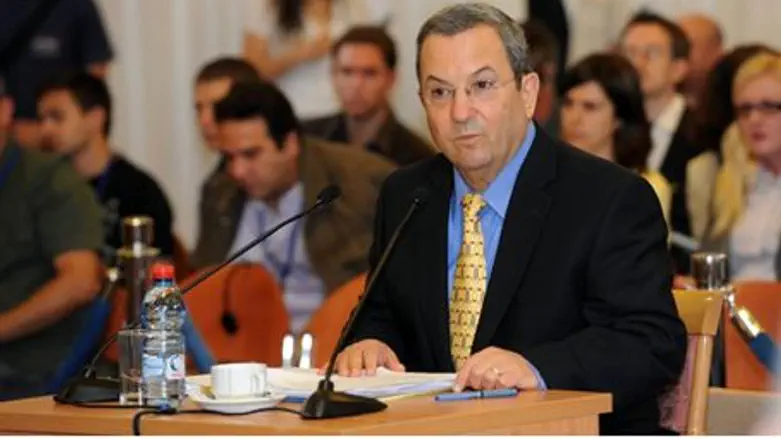
Defense Minister Ehud Barak testified Tuesday before the Turkel Commission that he took “full responsibility” for the clash on the Mavi Marmara flotilla vessel in May that left nine terror activists dead.
Barak was the second official to testify before the commission, having followed Prime Minister Binyamin Netanyahu in sessions that began Monday. IDF Chief of Staff Gabi Ashkenazi is scheduled to appear before the commission on Wednesday.
Barak: 'I Take Full Responsibility for IDF'
The Mavi Marmara, a Turkish ship, was one of six in the flotilla sent to break Israel's maritime blockade of Gaza and was found to be carrying no humanitarian aid despite public relations claims to the contrary.
Instead, it was manned by dozens of armed IHH terror activists, who ambushed Israeli navy commandos who boarded the vessel after the flotilla ignored repeated requests to change course and head for Ashdod port.
The Defense Minister told retired Supreme Court Justice Jacob Turkel, head of the commission, that he took “full responsibility for the military instructions that were issued during the flotilla operation.” He added that as Defense Minister, he bears “all responsibility for what happens in the IDF.”
The seven-member inner cabinet had met with the Prime Minister five days before the incident in order to decide how to handle the impending crisis, according to Barak's testimony. During that discussion, he alleged, the IDF Chief of Staff expressed concern over international reaction to Israel's operation, saying “it would not be simple but that we would do it.”
Netanyahu Confirmed: Barak Coordinated Ops
Prime Minister Netanyahu testified Monday amd confirmed that Barak was left in charge of the developing situation with the six-ship flotilla that was heading for Gaza, when he left for North America for diplomatic meetings. At the time, Netanyahu was scheduled for meetings first in Canada, and then in Washington D.C. at the White House with President Barack Obama. Immediately following the flotilla clash, Netanyahu postponed the meeting with Obama and returned to Israel from Canada.
“We anticipated not only the IDF operation to stop the ship, but also the international problem,” the Prime Minister told the commission. “I asked the Defense Minister to coordinate the entire affair.”
Turkey Tightened Ties with Iran
Meanwhile, Turkey was busy tightening its ties with Iran and Brazil. Just two weeks before the incident, an agreement was signed between Turkey, Iran and Brazil to transfer Iran's uranium for enrichment abroad, in defiance of a U.N. Security Council mandate.
“Turkey thereby strengthened its identification and cooperation with Iran just days before the flotilla,” Netanyahu pointed out. In addition, he noted that the Turkish government appeared to be passively encouraging the terrorist-linked IHH organization in its flotilla operation.
“Apparently, the Turkish government did not see the possible friction between the Turkish activists and Israel as anything that ran contrary to its interests, and certainly nothing that justified using effective pressure against the IHH activists... It appears that [Turkey] did not see in the prospect of a clash between Turkish activists and Israel something that clashed with its interests.”
Gaza Becoming 'Hamastan'
Netanyahu also explained during his testimony that Iran has become increasingly involved in Gaza, and has managed to successfully deliver numerous weapons to the region. “Iran provided Hamas with thousands of rockets, missiles, and other arms,” he told the commission, turning the region into “Hamastan.” Both Hamas and Iran have called for the annihilation of Israel, he reminded.
“Since this committee is dealing with the question of international law, I want to point out that Hamas is in violation of at least four war crimes: the call for genocide, fire directed at civilians, the use of civilians as human shields and preventing the Red Cross from visiting kidnapped soldier Gilad Shalit.”